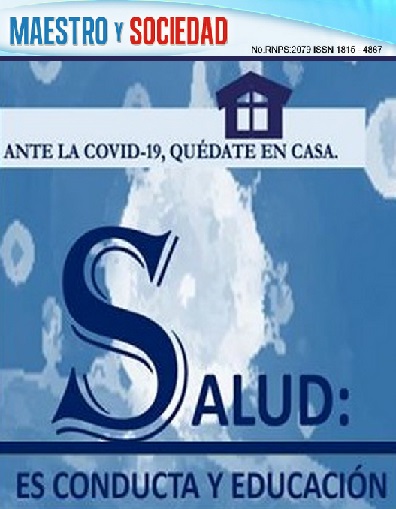Agronomic learning from personal living in the classes
Array
Keywords:
culture of the occupation, motivation, classroomAbstract
The polytechnic Agricultural Palma Soriano's Institute accomplishes the present investigating work itself at the municipality. Centers his attention in the elaboration of classrooms developers through exercises with the job of communicative techniques that they propitiate the development of the motivation at the classrooms, as well as perfecting and systematization of professional abilities that students learned from in previous levels for the achievement the culture of the agricultural occupation from the classrooms, increasing the power of the sensible expression and intervening esthetics the correct application of the ground ruleses of the works of cultivations through the different exercises and tasks that realize, influencing the formation of the personality of the new generations, to prepare them for his future insertion in this labor world (Public sector and state-owned no ).
References
2. Aguilar, M. J. (s.f.). Técnicas de animación grupal. http://enfenix.webcindario.com/profeweb/cultura/tecgrup.phtml
3. Allport, G. (1965). La personalidad: su configuración y desarrollo. La Habana: Editorial Revolucionaria. Universidad de la Habana.
4. Bermúdez M., R. (2002). Dinámica de grupo en Educación: su facilitación. La Habana: Editorial Pueblo y Educación.
5. Cerezal M., J. y Ordóñez S., E. (2014). La clase de educación laboral. Sugerencias para el maestro. La Habana: Editorial Pueblo y Educación.
6. González, F. y Mitjans, A. (1989). La personalidad, su educación y desarrollo. La Habana: (s.e.).
7. González R., N. (1996). Técnicas participativas de educadores cubanos. (Tomo I, II y III). La Habana: Ed. Colectivo de Investigación Educativa, Graciela Bustillos, Proyecto Educativo de la Asociación de Pedagogos de Cuba.
8. Millán, B. (2002). Necesidades de aplicación de técnicas participativas que propicien el desarrollo integral de los alumnos. Guatemala: Universidad de San Carlos.
9. Seijas B., C. R. (2014). Teoría y metodología de la educación artística. La Habana: Editorial Pueblo y Educación.
10. Silvestre O., M., y Zilverstein T., J. (1997). Hacia una didáctica desarrolladora. La Habana: Editorial Pueblo y Educación.
11. Torres R., O. (s.f.). El aprendizaje grupal. Clasificación de los grupos. Recuperado de http://www.metabase.net/docs/ecd-una/00677.html
12. Torres R., O. (1997). Técnicas para el trabajo grupal. Cuernavaca, México: Universidad Autónoma de Morelos.
13. Vargas, L. (1984). Las técnicas participativas en la Educación Popular. Madrid: (s.e.).
14. Vargas, L. (2007). Programa estratégico de Educación Cívica 2005-2010. Técnicas participativas. Barcelona: (s.e.).
15. Vargas, L. (2002). En momento de maduración los programas educacionales. Granma, p. 8.
16. Vargas, L. (2011). La educación agropecuaria en la escuela cubana actual. Villa Clara: Universidad Pedagógica “Félix Varela Morales”.
Published
How to Cite
Issue
Section
License
This journal provides immediate open access to its content, based on the principle that offering the public free access to research helps a greater global exchange of knowledge. Each author is responsible for the content of each of their articles.



























 Universidad de Oriente
Universidad de Oriente 